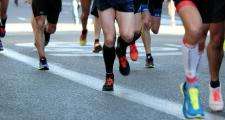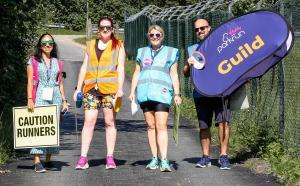World first as secure mental hospital launches parkrun

A weekly parkrun within a secure mental health hospital has been created by a team of social workers.
The unique initiative aims to promote wellbeing and break down barriers between staff and service users at Guild Lodge, run by the Lancashire & South Cumbria NHS Foundation Trust (LSCft).
Like other parkruns, participants complete a five kilometre course starting at 9am every Saturday morning.
Unlike other runs, however, the LSCft is a closed event with added safeguarding measures and aims to provide a safe environment for participants with complex mental health care needs. Most patients taking part have been detained under the Mental Health Act at the Preston-based hospital.
Michael Holt, associate director of social work at LSCft who co-founded the run, said: “I did a needs analysis which found our service users are disadvantaged in terms of opportunities for engagement in exercise and social activities.
“I have always been interested in running and know the impact it has on physical and mental health. So we looked at developing a parkrun at the secure hospital for service users and staff based there.
“For the next seven months we worked with parkrun to set up what is the first NHS-initiated parkrun and the world’s first secure mental health parkrun.
“The aim is to provide regular social and physical exercise opportunities for some of the most disadvantaged, disempowered, and excluded individuals in society.”

Parkrun was launched in London in 2004 to promote health and social wellbeing through weekly runs at any level of ability.
It has since grown to take place at more than 1,300 locations in the UK and has spread to more than 20 other countries.
The LSCft run is modelled on a similar initiative within 25 prisons and young offenders’ institutions in the UK.
It takes place on LSCft land, with participants completing six laps of a course around the grounds of Guild Lodge.
A risk assessment is done by a multidisciplinary team to ensure in-patients are healthy enough physically and mentally to take part. Staff joining the run wear name badges to ensure the event remains closed. Service users and staff members can also act as volunteers facilitating the runs.
Michael says his team were keen to promote a “social model” toward improved health and wellbeing within the hospital.
“The biggest impact it has had is on people’s relationships and the social element, not just for service users but for staff as well.
“Service users talk about losing the label of being identified as a patient. When they attend parkrun they are just another participant. Members of staff are the same. It is a massive leveller that gets rid of the hierarchy and distinction between patient and staff.”
Michael said the initiative has led to improvements in health, motivation, and social connection transforming service user-staff relationships as well as those between departments and professionals.
“One service user wasn’t a runner but attended the event and then during the week started running the course herself," he said.
“She completed a ten kilometre run last year and this year a half marathon and a marathon.
“She has lost four stone and talks about [running] having a transformational impact in supporting her recovery. She is on the pathway to discharge and her plan is to continue running.”
LSCft is sharing findings from the initiative with other health and social care organisations.
